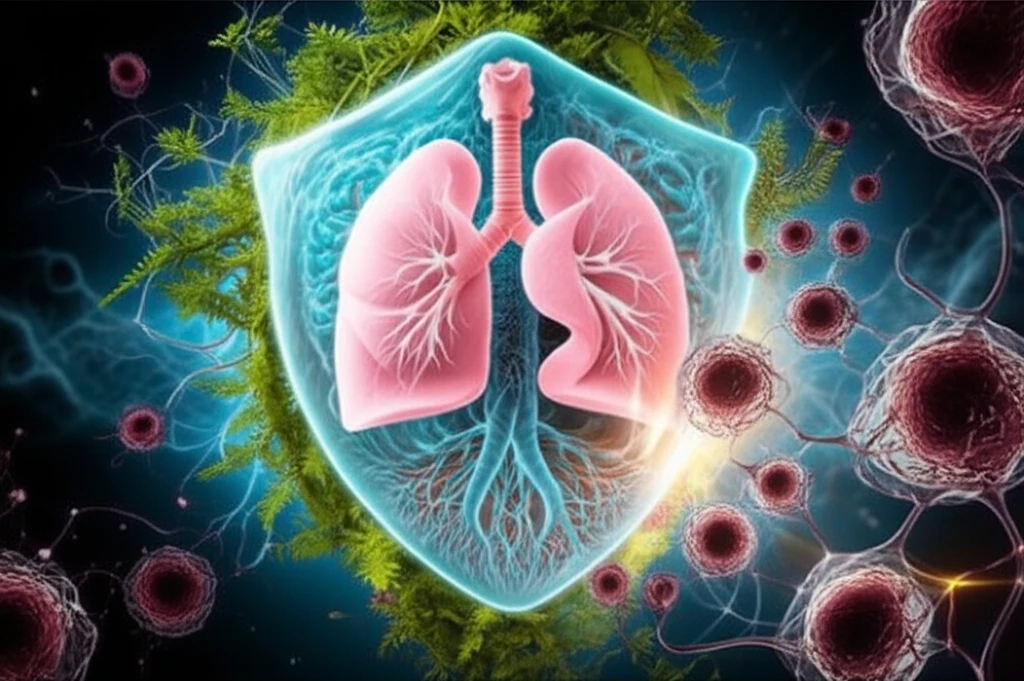
Lung Cancer Breakthrough: Can This Herbal Formula Boost Immunity and Fight Tumors?
"Discover how a traditional Chinese medicine-inspired blend of Astragalus Polysaccharide (APS) and Polysaccharopeptide (PSP) could revolutionize lung cancer treatment by enhancing immunity and suppressing tumor growth."
Lung cancer remains a significant global health challenge, demanding innovative therapeutic strategies. While conventional treatments like chemotherapy and radiation play a crucial role, researchers are increasingly exploring complementary approaches to improve patient outcomes and quality of life. One promising area of investigation lies in the realm of traditional Chinese medicine (TCM), where herbal remedies have been used for centuries to promote health and well-being.
Among the diverse array of TCM therapies, Astragalus Polysaccharide (APS) and Polysaccharopeptide (PSP) have garnered attention for their potential immunomodulatory and anti-tumor properties. APS, derived from Astragalus mongholicus, and PSP, a protein-bound polysaccharide extracted from cultivated mycelia, have individually demonstrated promising effects in preclinical studies. Now, researchers are exploring the combined power of these two compounds in a synergistic herbal formula.
This article delves into a recent study investigating the immunomodulatory and anti-tumor effects of a combined APS and PSP herbal formula in mice with lung cancer. By examining the impact of this formula on immune parameters, tumor growth, and overall health, we aim to shed light on its potential as a complementary therapy for lung cancer and explore the implications for future research and clinical applications.
APS and PSP: A Dynamic Duo for Lung Cancer Treatment?

The study, published in the International Journal of Biological Macromolecules, investigated the effects of an herbal formula combining APS and PSP on mice with lung cancer. The researchers aimed to determine if this formula could enhance the immune system's ability to fight cancer and directly inhibit tumor growth.
- Improved Immune Function: The herbal formula significantly increased white blood cell (WBC) counts, indicating a boosted immune response. It also enhanced thymus and spleen indices, crucial organs for immune function.
- Enhanced Immune Cell Activity: The formula increased the ratio of CD4+ to CD8+ T cells, critical for coordinating immune responses against cancer.
- Modulated Cytokine Levels: The herbal blend upregulated key Th1 cytokines (IL-2, TNF, IFN-γ) and IL-17A, known for their roles in anti-tumor immunity, while reducing levels of IL-10, a cytokine associated with immune suppression in cancer.
- Tumor Growth Inhibition: The PSP+APS formula demonstrated a comparable tumor-inhibiting effect to the chemotherapy drug ADM, suggesting a direct anti-cancer activity.
The Future of Lung Cancer Treatment: A Blend of Tradition and Science?
This study offers a compelling glimpse into the potential of herbal formulas like APS and PSP as complementary therapies for lung cancer. By modulating the immune system and directly targeting tumor growth, this approach could offer a more holistic and personalized treatment strategy.
While these findings are encouraging, it's crucial to acknowledge that this research was conducted on mice. Further studies are needed to confirm the safety and efficacy of this herbal formula in humans. Clinical trials are essential to determine the optimal dosage, administration method, and potential interactions with conventional cancer treatments.
The integration of traditional medicine with modern scientific research holds immense promise for advancing cancer care. As we continue to unravel the complex interplay between the immune system and cancer, herbal formulas like APS and PSP may pave the way for more effective and less debilitating treatments, ultimately improving the lives of those affected by lung cancer.
